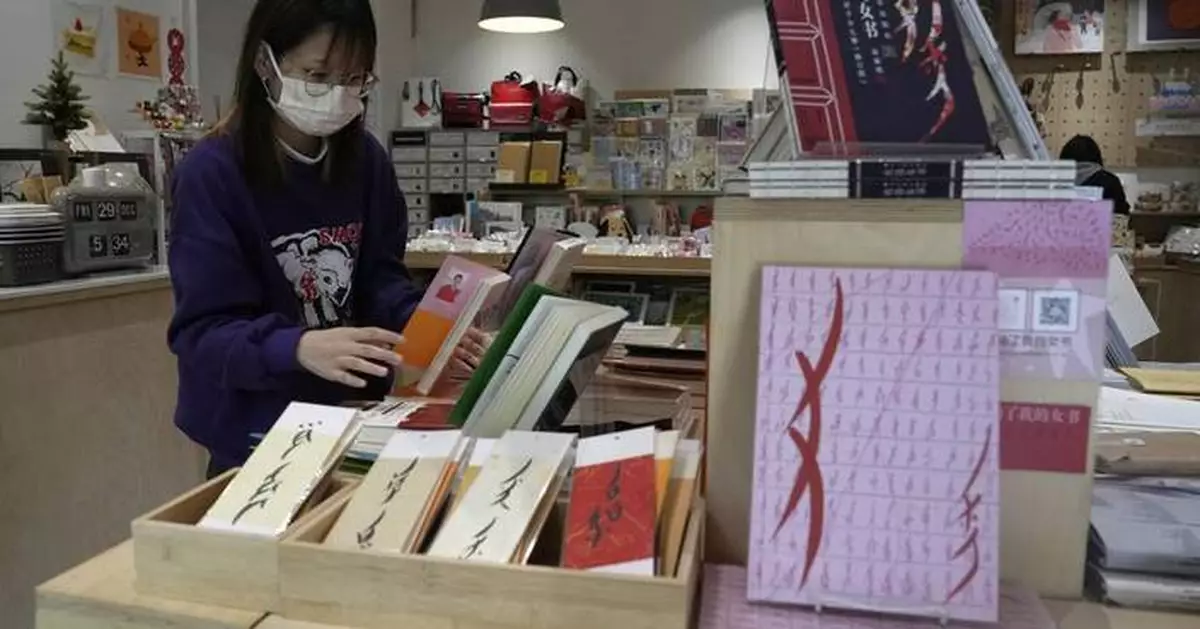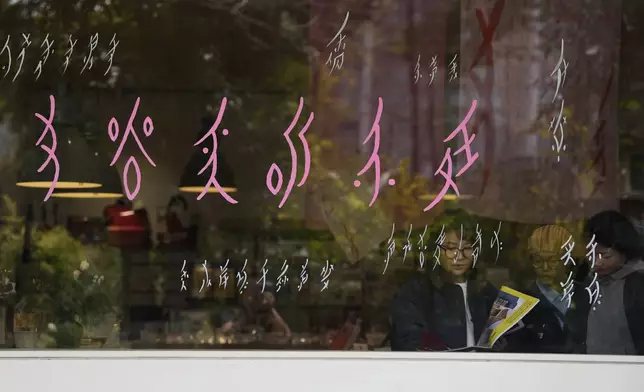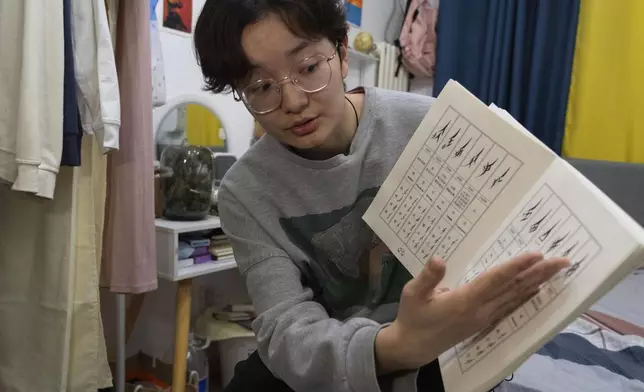BEIJING (AP) — Chen Yulu never thought her home province of Hunan had any culture that she would be proud of, much less become an ambassador of.
But these days, the 23-year-old is a self-proclaimed ambassador of nüshu, a script once known only to a small number of women in the south China.
It started as a writing practiced in secrecy by women who were barred from formal education in Chinese. Now, young people like Chen are spreading nüshu beyond the women’s quarters of houses in Hunan's rural Jiangyong, the county whose distinct dialect serves as the script's verbal component.
Today, nüshu can be found in independent bookstores across the country, subway ads, craft fair booths, tattoos, art and even everyday items like hair clips.
Nüshu was created by women from a small village in Jiangyong, in the southern province where Mao Zedong was born, but there’s little consensus on when it originated. Scholars estimate the script is at least several centuries old, from when reading and writing were deemed male-only activities. So the women developed their own script to communicate with each other.
The script is slight with gently curving characters, written with a diagonal slant that takes up much less space than boxy modern Chinese with its harsh angles.
“You won’t allow me to go to school. Okay, I get it. So what’s my way out? I’ll find ways to educate myself,” said Xu Yan, 55, the author of a textbook on nüshu.
Women lived under the control of either their parents or their husband, using nüshu, sometimes called “script of tears,” in secret to record their sorrows: unhappy marriages, family conflicts, and longing for sisters and daughters who married and could not return in the restrictive society.
Xu is also the founder of Third Day Letter, a nüshu studio in Beijing named after a centuries-old practice by the script's practitioners. The third-day letter is a hand-sewn book presented in farewell to a woman in Jiangyong on the third day after her marriage, when she’s allowed to visit the childhood home she left.
The script became a unique vehicle for composing stories about women’s lives, typically in the form of seven-character line poems that are sung. A secret world sprung form the script that gave Jiangyong women a voice through which they found friends and solace.
That secret world still resonates today as a source of strength for young women dissatisfied with patriarchal constraints.
Chen, who studied photography at an art school in Shanghai, said her male professors often doubted that she could keep up with the male photographers because of her slight physique. That attitude, she said, is “in every aspect of life, there’s nowhere it doesn’t touch.”
She was frustrated but didn't see much room to push back — until she learned about nüshu.
“I felt that I had received a very strong power, and I think a lot of women need this power,” she said.
Chen wanted to make a documentary about feminism and came across nüshu in her online search. When she realized the script originated from Jiangyong, just a few hours from her hometown, she immediately knew that she had found her graduation project's topic.
The more she learned about this script, the more she learned about its duality: that it was as much a painful thing as it was a source of strength.
In her documentary, she follows He Yanxin, a formally designated inheritor for nüshu who is now in her 80s. She asks Chen, “Do you think nüshu has any use?” Chen says yes. In response, He says, “Nüshu is useless.”
He comes from Jiangyong and says she was forced to marry a man she didn't want to be with, who physically abused her and tore up photos from nüshu meetups and workshops she attended. She did not feel that the script had made her life materially better, according to Chen's first-person account, published on social media.
Yet, He is the one who urged her to learn the script.
Formal inheritors of the script have to be from Jiangyong, Chen said, and have to master the nüshu, but there was nothing stopping her from sharing her love of the script with others.
Beginning in 2022, Chen began spreading the practice. She started an online nüshu group, taught writing workshops and set up nüshu art exhibitions in cities across China. Most participants at her writing workshops are women, she said, and some people even bring their mothers. Chen also runs a social media account to promote nüshu and its culture beyond Hunan.
Lu Sirui, a 24-year-old working as a marketer, learned about nüshu from online feminist groups and joined Chen’s nüshu-focused WeChat group.
“At first I just knew that it was a women’s inheritance, belonged only among women,” Lu said. "Then, as I got to know it better, I realized that it was a kind of resistance to traditional patriarchal power.”
For Lu, nüshu means “a very powerful rebellion” and a bond of sisterhood. She said it was important for women to stick together.
Lu once encountered a rental agent in Beijing who, drunk in the middle of the night, knocked on her door and tried to enter her home. Lu said that she picked up a stick at the doorway and ran out to confront him. Afterwards, she confided in a small feminist community online, where she received comfort and advice on how to handle the situation. She says communities like that have supported her in the face of gender-based violence, inequality and mother-daughter relationship problems, among other challenges.
Seeing nüshu as another representation of sisterhood, Lu bought a textbook and practices the script in her spare time. Even though she is not a formal nüshu ambassador, she began hosting nüshu workshops at bookstores and bars in Beijing. When organizing these events, Lu discovered that very few people had heard of nüshu, but the feedback was always positive.
“It’s a manifestation of female strength that transcends time and space,” Lu said.
AP researcher Wanqing Chen contributed to this report.

Visitors to a bookstore specializing in nüshu, a centuries-old secret script, browse materials, behind the window with nüshu writing in Chengdu in southwestern China's Sichuan province, March 17, 2024. (AP Photo/Ng Han Guan)
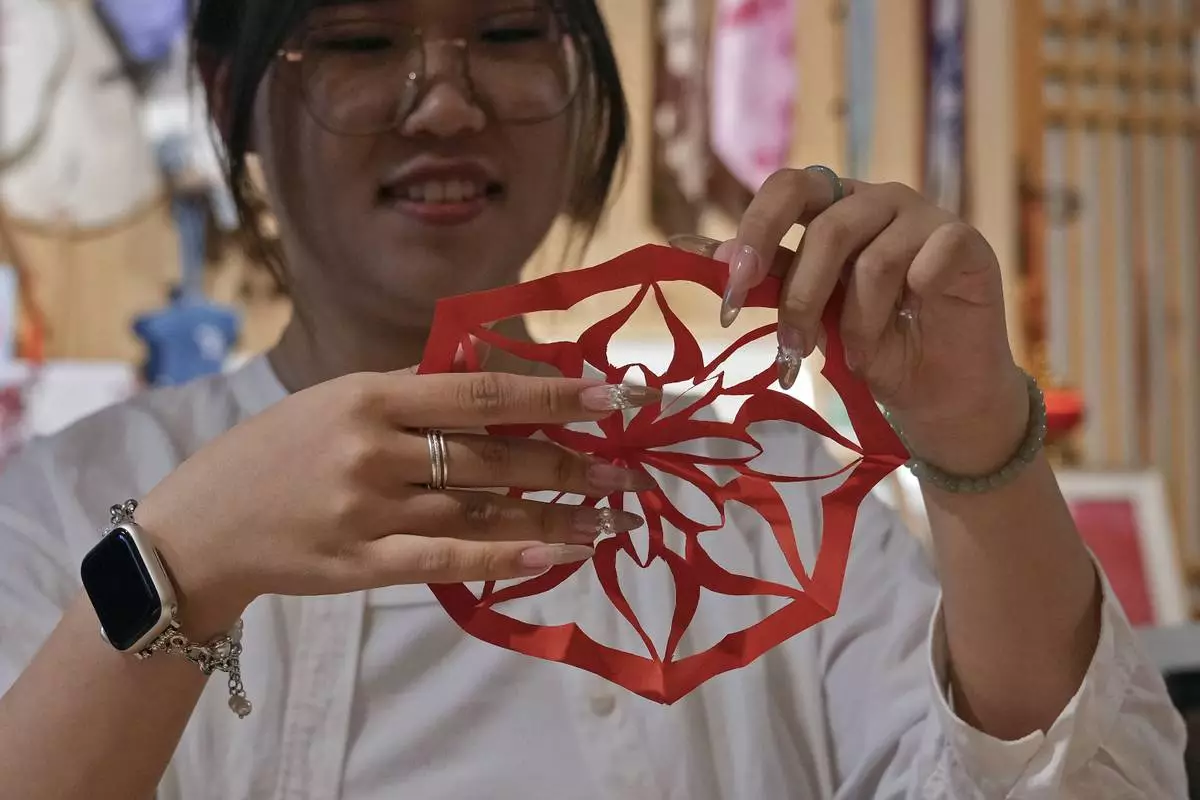
A university student shows a "nüshu" calligraphy paper cutting, at Xu Yan's Third Day Letter studio in Beijing on July 11, 2024. Nüshu is a centuries-old secret script. (AP Photo/Andy Wong)
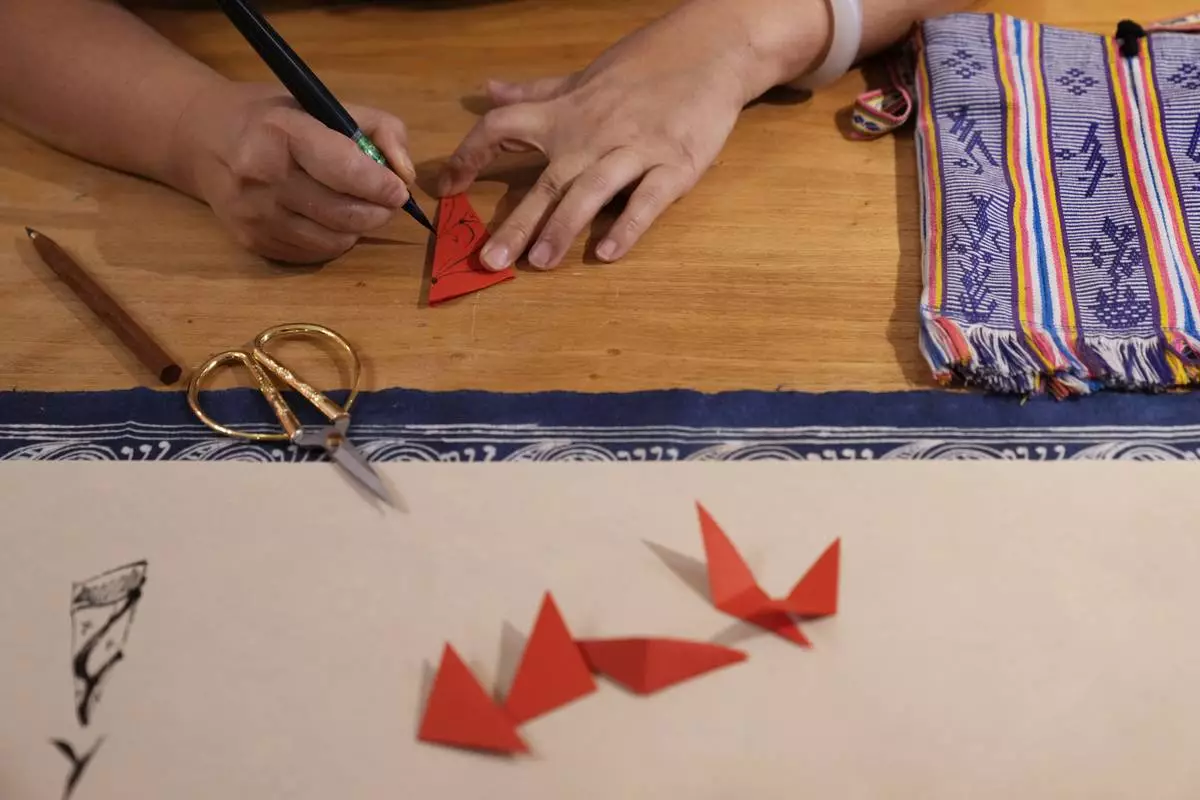
Xu Yan, an author of a textbook on nüshu, a centuries-old secret script, writes nüshu on paper cuttings at her studio in Beijing on July 11, 2024. (AP Photo/Andy Wong)
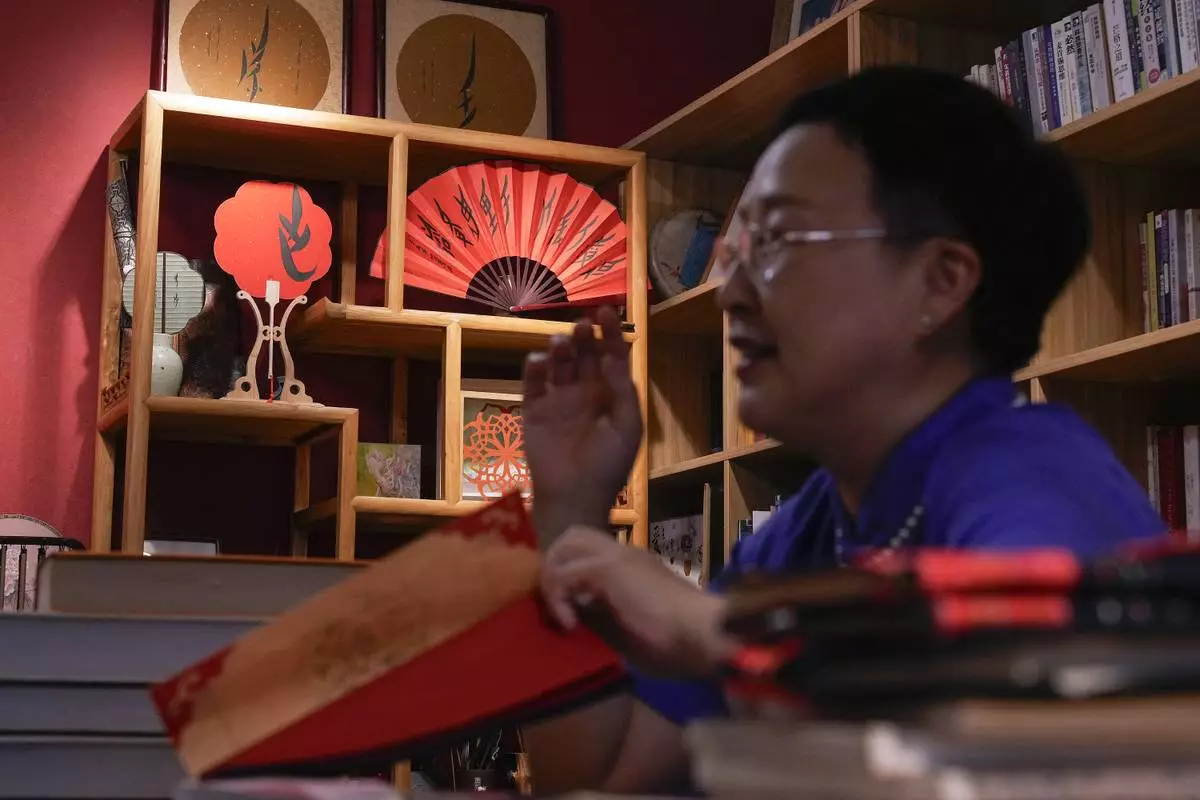
Xu Yan, an author of a textbook on nüshu, a centuries-old secret script, talks about the script at her studio in Beijing on July 11, 2024. (AP Photo/Andy Wong)
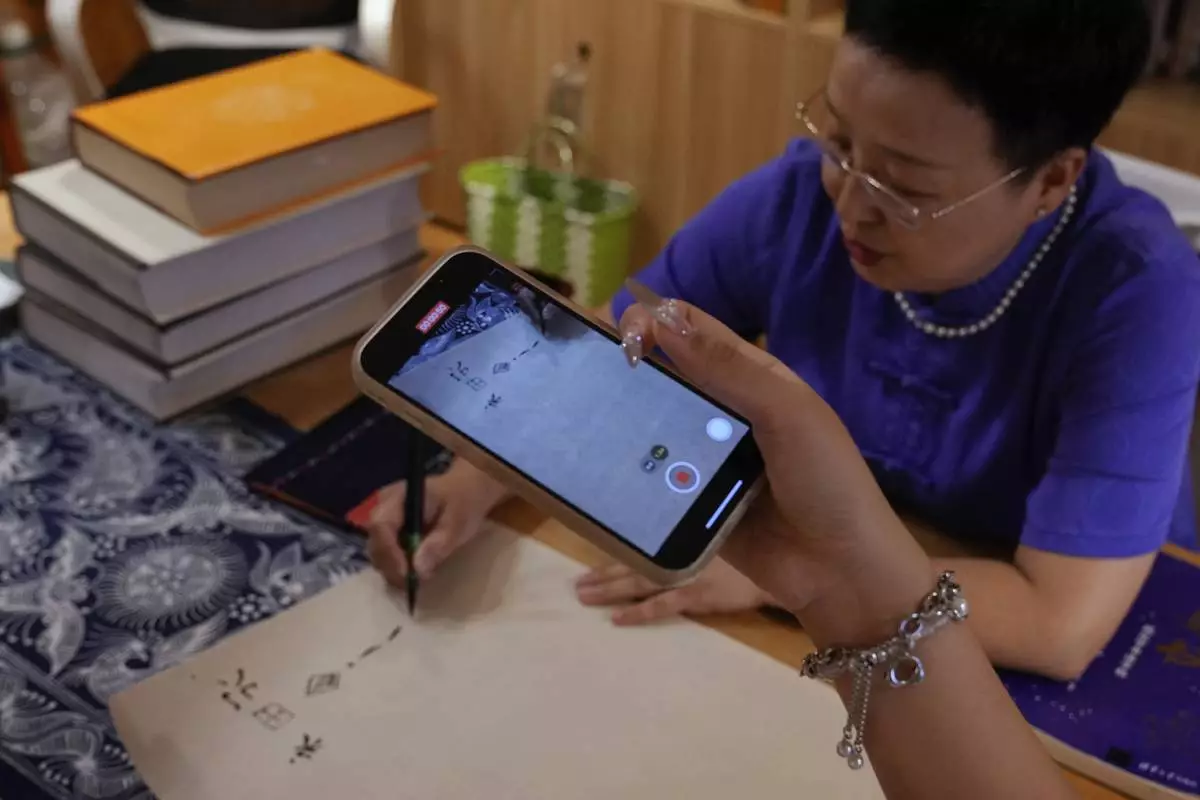
A student uses a smartphone to film Xu Yan, an author of a textbook on nüshu, a centuries-old secret script, demonstrating to write nüshu calligraphy at her studio in Beijing on July 11, 2024. (AP Photo/Andy Wong)
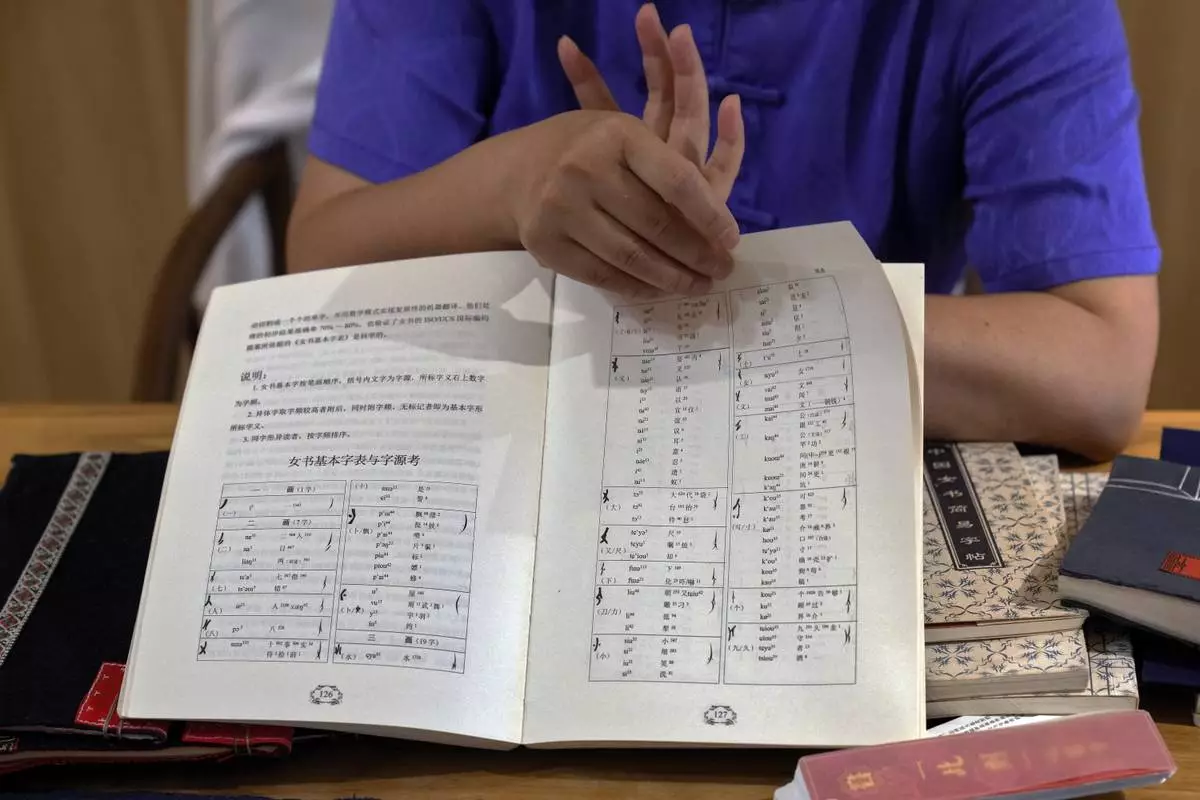
Xu Yan, an author of a textbook on nüshu, a centuries-old secret script, shows a book of nüshu calligraphy to the visiting university students at her studio in Beijing on July 11, 2024. (AP Photo/Andy Wong)
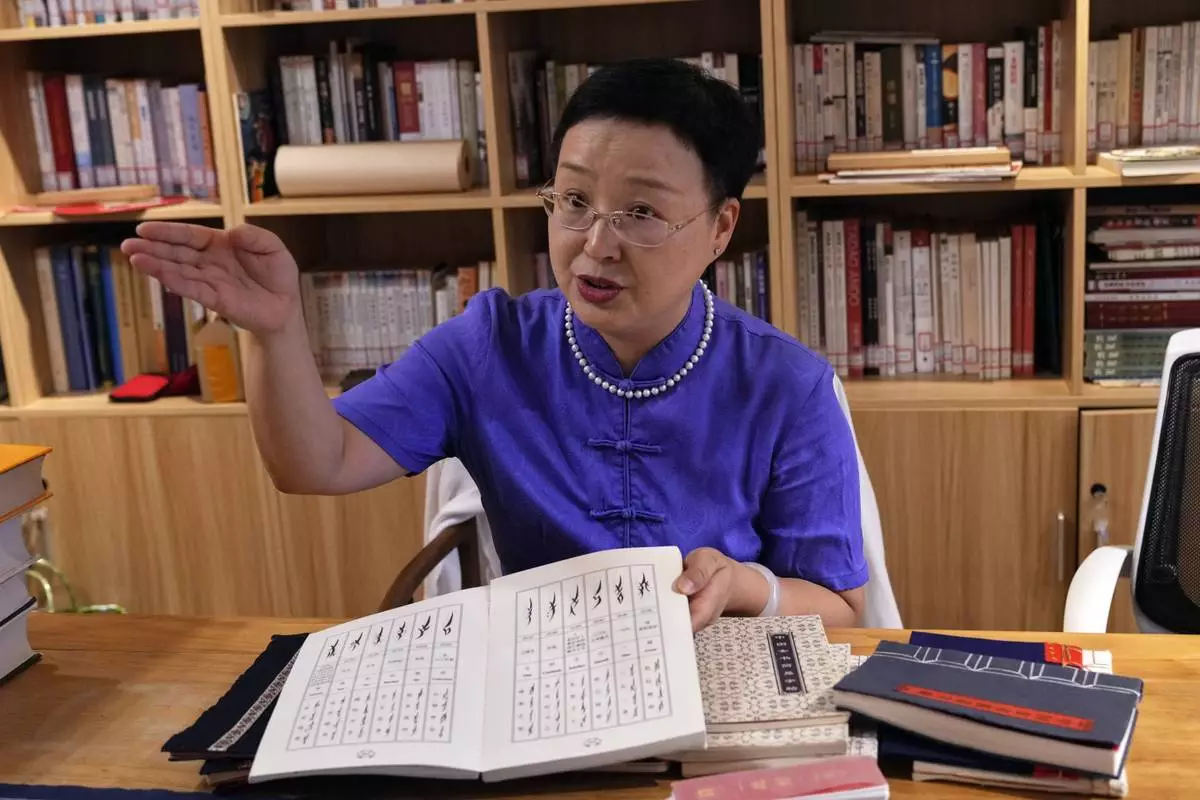
Xu Yan, an author of a textbook on nüshu, a centuries-old secret script, shows a book of nüshu calligraphy to the visiting university students at her studio in Beijing on July 11, 2024. (AP Photo/Andy Wong)
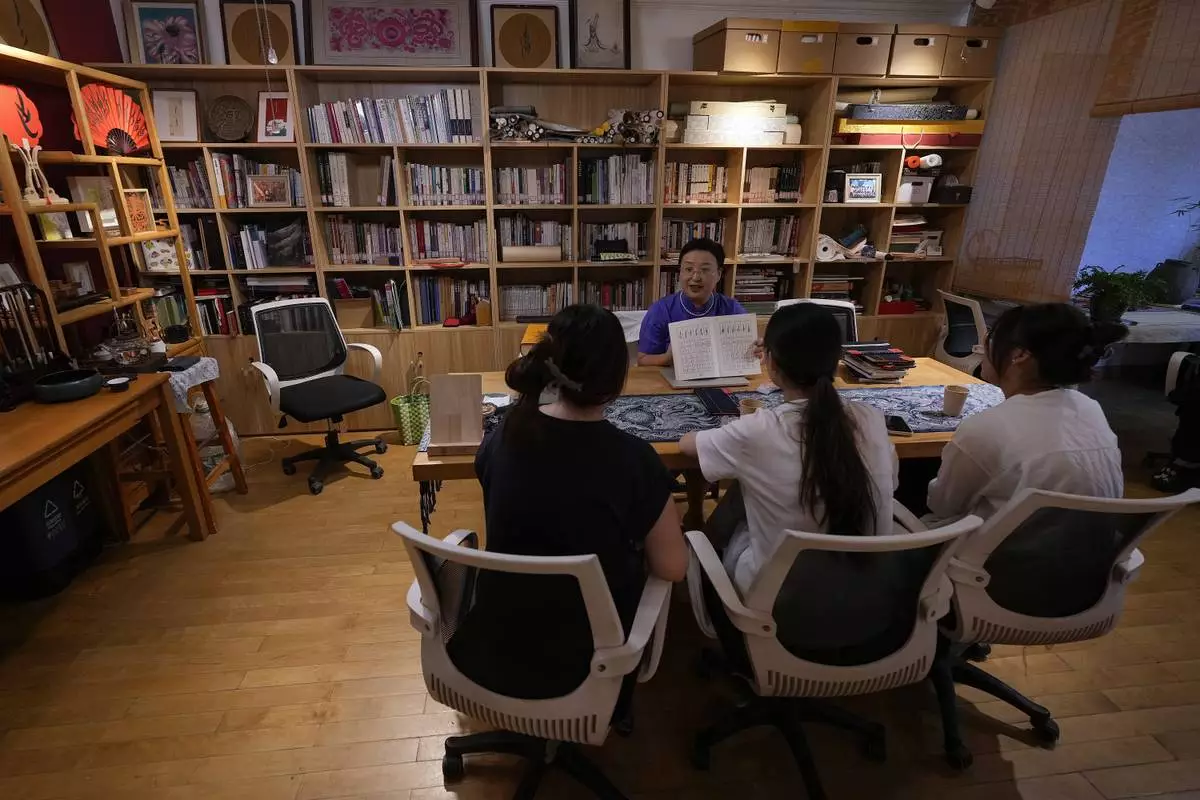
Xu Yan, an author of a textbook on nüshu, a centuries-old secret script, shows a book of nüshu calligraphy to the visiting university students at her studio in Beijing on July 11, 2024. (AP Photo/Andy Wong)
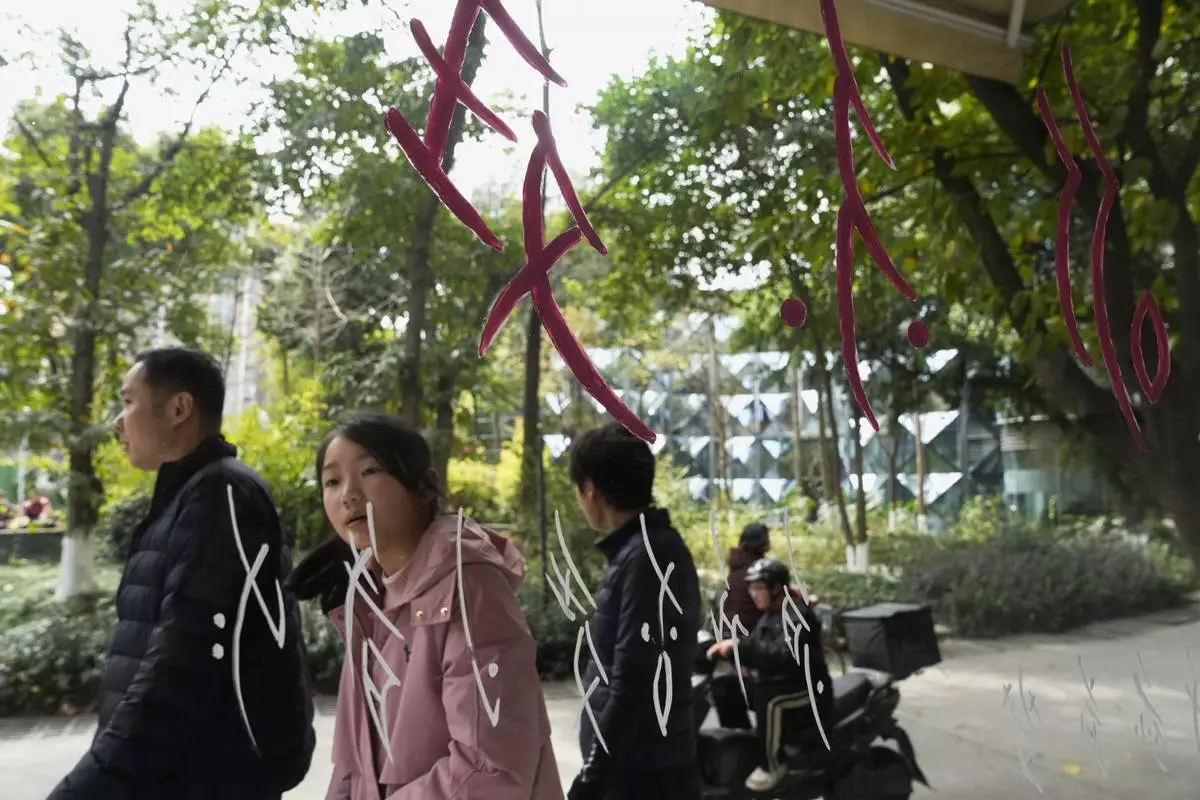
People pass by a window store displaying nüshu, a centuries-old secret script, at a bookstore specializing in nüshu content in Chengdu in southwestern China's Sichuan province, March 17, 2024. (AP Photo/Ng Han Guan)
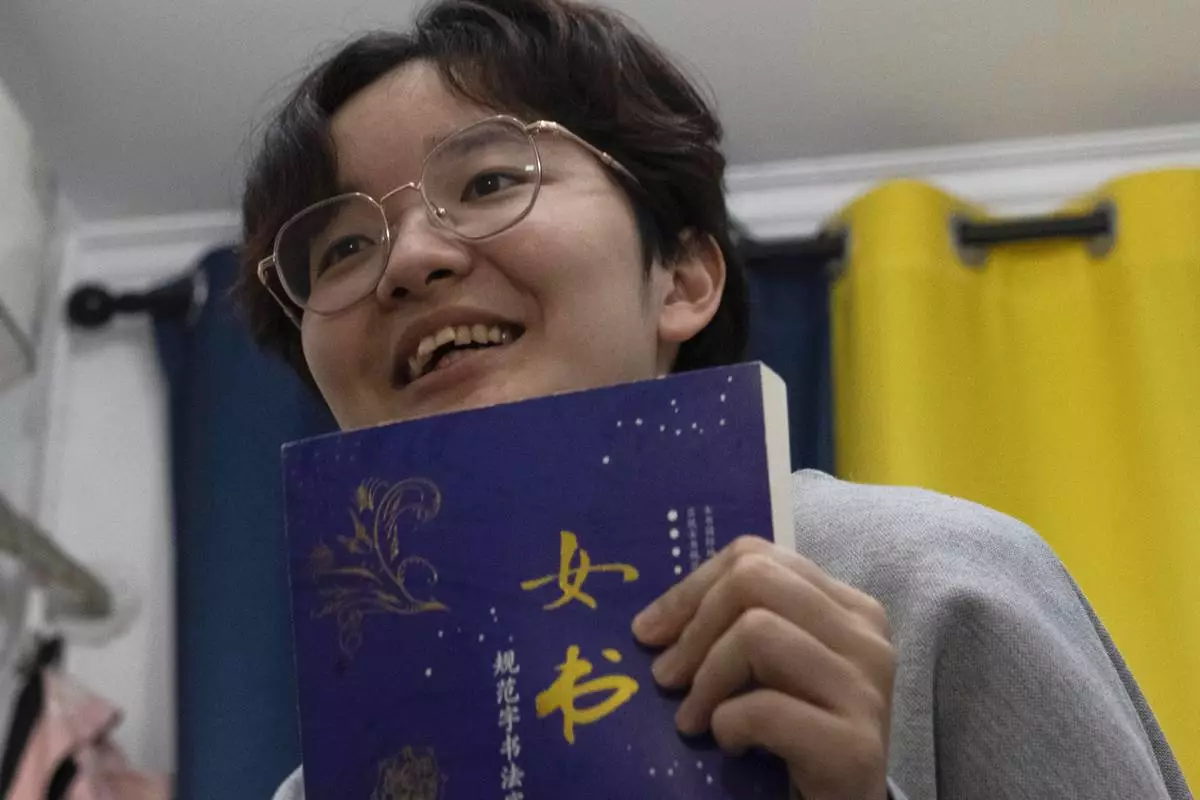
Lu Sirui, a 24-year-old working as a marketer, holds up a book with the word for nüshu, a centuries-old secret script, during an interview in Beijing, March 18, 2024. (AP Photo/Olivia Zhang)

Lu Sirui, a 24-year-old working as a marketer, talks about nüshu, a centuries-old secret script, that she has learned from online feminist groups, in Beijing, March 18, 2024. (AP Photo/Olivia Zhang)
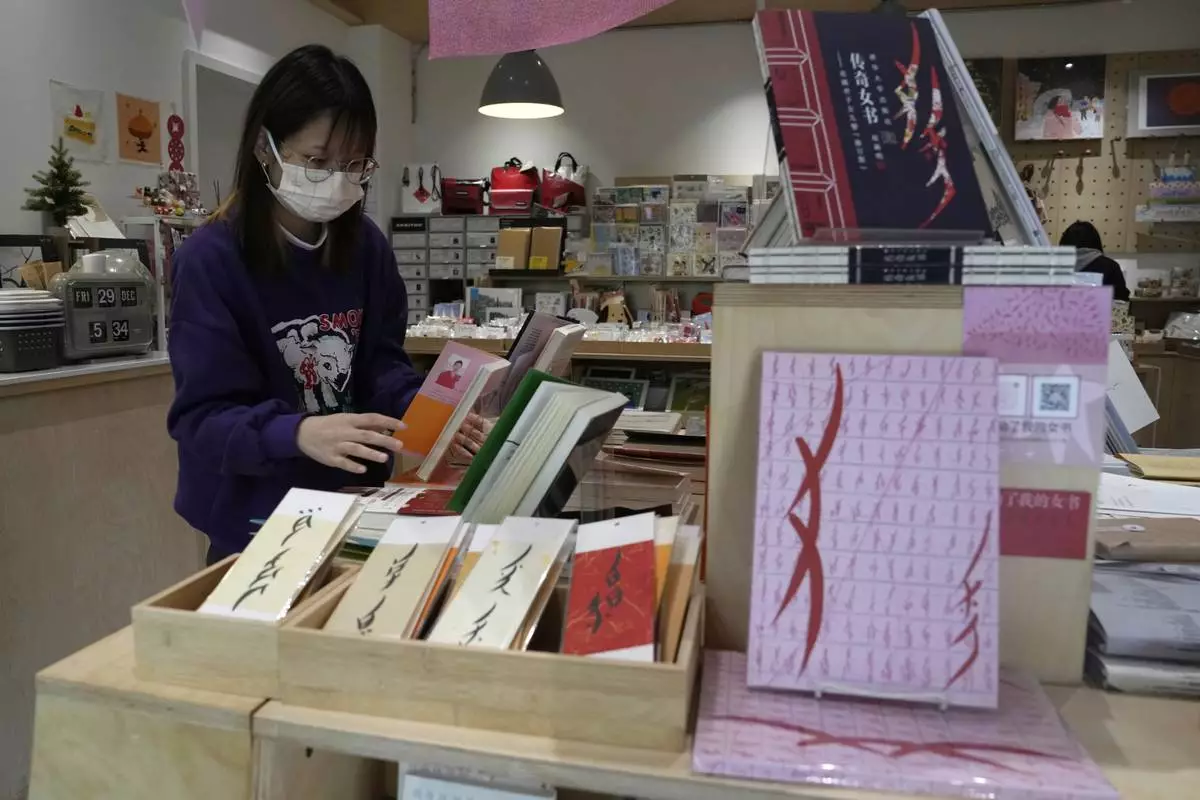
A worker arranges books at a bookstore specializing in nüshu, a centuries-old secret script, in Chengdu in southwestern China's Sichuan province, March 17, 2024. (AP Photo/Ng Han Guan)


